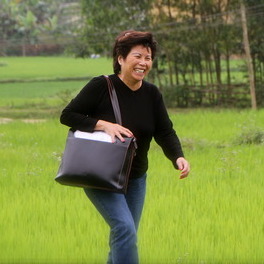A Quote by Susan Wittig Albert
Sharing our stories can also be a means of healing. Grief and loss may isolate us, and anger may alienate us. Shared with others, these emotions can be powerfully uniting, as we see that we are not alone, and realize that others weep with us.
Related Quotes
The healing that can grow out of the simple act of telling our stories is often quite remarkable. Even more remarkably, this healing is not just our own healing, it is the healing of all women. That's why, as we tell our stories to ourselves, it is also important to share them with others. This sharing brings a sense of kinship, of sisterhood. We understand that we are not alone in our efforts to become conscious, whole, healthy persons.
We must die alone. To the very verge of the stream our friends may accompany us; they may bend over us, they may cling to us there; but that one long wave from the sea of eternity washes up to the lips, sweeps us from the shore, and we go forth alone! In that untried and utter solitude, then, what can there be for us but the pulsation of that assurance, "I am not alone, because the Father is with me!
For you see, the face of destiny or luck or god that gives us war also gives us other kinds of pain: the loss of health and youth; the loss of loved ones or of love; the fear that we will end our days alone. Some people suffer in peace the way others suffer in war. The special gift of that suffering, I have learned, is how to be strong while we are weak, how to be brave when we are afraid, how to be wise in the midst of confusion, and how to let go of that which we can no longer hold. In this way, anger can teach us forgiveness, hate can teach us love, and war can teach us peace.
Our sense of identity is in large measure conferred on us by others in the ways they treat or mistreat us, recognize or ignore us, praise us or punish us. Some people make us timid and shy; others elicit our sex appeal and dominance. In some groups we are made leaders, while in others we are reduced to being followers. We come to live up to or down to the expectations others have of us.
. . . the number of prayers we say may contribute to our happiness, but the number of prayers we answer may be of greater importance. Let us open our eyes and see the heavy hearts, notice the loneliness and despair; let us feel the silent prayers of others around us; and let us be an instrument in the hands of the Lord to answer those prayers.
The least livable life is the one without coherence-nothing connects, nothing means anything. Stories make connections. They allow us to see our past, our present, and our future as interrelated and purposeful.... The stories we value most reassure us that life is worth the pain, that meaning is not an illusion, and that others share our experience with us.
There is no end to the good we can do, to the influence we can have with others. Let us not dwell on the critical or the negative. Let us pray for strength; let us pray for capacity and desire to assist others. Let us radiate the light of the gospel at all times and all places, that the Spirit of the Redeemer may radiate from us.
Others may doubt us. They may criticize us. They may try to deny us what is rightfully ours. But they will fail. And I promise you, as long as I am mayor, I will never back away from fighting any opponent - or confronting any obstacle - that would prevent our people from achieving all of their dreams in Our New York.
Many people do not know that they can strengthen or diminish the life around them. The way we live day to day simply may not reflect back to us our power to influence life or the web of relationships that connects us. Life responds to us anyway. We all have the power to affect others. We may affect those we know and those we do not even know at all. . . . Without our knowing, we may influence the lives of others in very simple ways.
Emotional dependence is the opposite of emotional strength. It means needing to have others to survive, wanting others to "do it for us," and depending on others to give us our self-image, make our decisions, and take care of us financially. When we are emotionally dependent, we look to others for our happiness, our concept of "self," and our emotional well-being. Such vulnerability necessitates a search for and dependence on outer support for a sense of our own worth.
Sometimes it may seem to us that there is no purpose in our lives, that going day after day for years to this office or that school or factory is nothing else but waste and weariness. But it may be that God has sent us there because but for us, Christ would not be there. If our being there means that Christ is there, that alone makes it worthwhile.
To conclude this discussion, assessment of justice demands engagement with the 'eyes of mankind',first, because we may variously identify with the others elsewhere and not just with our local community;second, because our choices and actions may affect the lives of others far as well as near;and third,because what they see from their respective perspective of history and geography may help us to overcome our own parochialism.




































